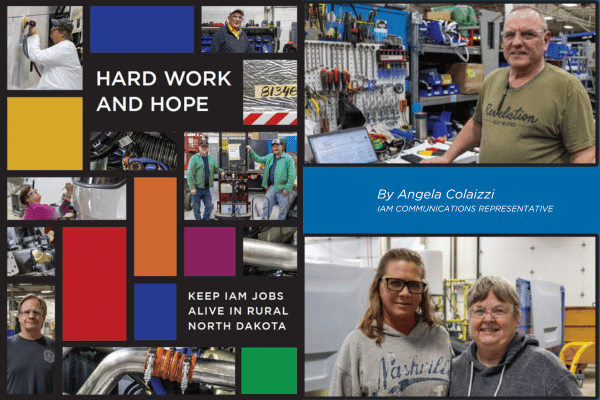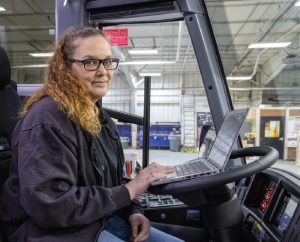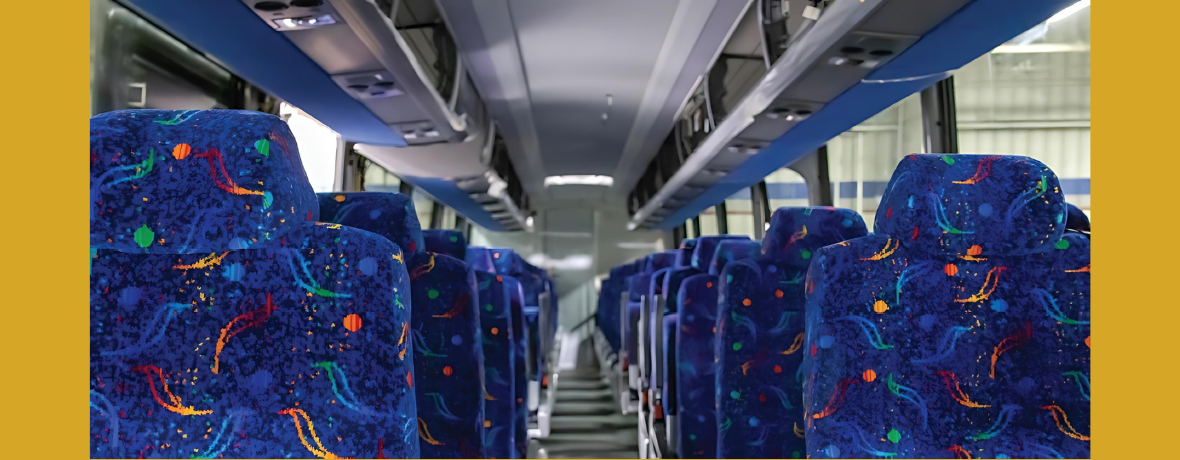

This article was featured in the IAM Summer 2024 Journal and written by IAM Communications Representative Angela Colaizzi.
Pembina is a rural town of 500 people in North Dakota just three miles south of the Canadian border. It is home to only one major employer in the region, the Motor Coach Industries (MCI) bus plant.

Jennifer Winkler, IAM Local W384 President, MCI electrician.
MCI has been operating in Pembina since 1963 and has provided family-supporting IAM union jobs to residents of its surrounding areas for decades. So when MCI’s parent company, New Flyer Inc., announced in May 2022 that it would be shuttering the Pembina plant and moving its work to their Crookston, Minn. and Winnipeg, Manitoba facilities, workers and community members were shocked, heartbroken and in disbelief.
“One or two of us left the same day they announced the closure,” said Jennifer Winkler, president of IAM Local W384, which represents the 175 members who work at MCI.
“It was shocking. We thought they were just reviewing the process here or making sure we were meeting our goals,” said Winkler. “We didn’t know the stand-up meeting was over a closure. So when they announced it, everybody was shocked. A few people were swearing, and others were crying.”
Local W384 members, who decided to continue working up until the last day in hopes that New Flyer would change its mind, asked the company what they could do to keep work in Pembina.
IAM District 5 Directing Business Representative Jeremy Pearson and Assistant Directing Business Representative Joe Schwartz were on the phone immediately with Winkler. The union had suspected the year prior that MCI was taking steps toward closing the plant and was prepared to fight it in every way possible, and at minimum, make sure that Local W384 members were taken care of up until the end.
IAM BRINGS THE FIGHT
The plant was set to close on June 8, 2023, a year after the announcement, and the union entered into effects bargaining with the company, but also jumped into action to try to change the company’s decision and keep jobs in Pembina.
“That was just the attitude most of us had, to continue to do our work well, and do what we needed to do,” said Winkler.
“These members have worked hard. They’ve never given up,” said Schwartz. “In every labor-management meeting we went into, we talked to about keeping the plant open. We asked them what the Machinists Union can do to keep the plant open.”

The plant manager gave hope to those who stayed that the company could reverse its decision.
“[The plant manager] always had that enthusiasm at our labor-management meetings that we could keep the plant open,” said Winkler. “He kept saying ‘I plan to retire from here. We have to do what it takes. You guys keep doing what you’re doing, and we can turn this around.’ I think that kept people working hard, hoping for the best, but preparing for the worst,” said Winkler.
Just a few days after the closure announcement, the IAM penned a letter to North Dakota’s congressional delegation asking for their assistance in saving MCI’s 175 IAM jobs.
The IAM Political and Legislative Department also raised the union’s concerns to North Dakota’s congressional delegation about the effect this plant closure would have on the area’s economy and surrounding communities.
Schwartz met with all of North Dakota’s legislators while at the IAM’s Legislative Conference. He had conversations with them about what could be done to give MCI incentives to stay in Pembina.
“One of the costs associated with this plant is that its energy comes from oil fuel that is very expensive,” said Schwartz. “They do have a natural gas line that is close by them,
and that’s one of the things that we’ve been pushing on legislators and local officials: to get that natural pipeline brought into Pembina so that the company could cut their costs as far as running the plant goes.”
The IAM Communications Department made sure the union’s efforts to fight the company’s plans were publicized in the press. The IAM launched a letter-writing campaign to North Dakota’s congressional delegation, asking for the legislators to push back against MCI’s decision and rethink devastating these North Dakotans and their families.
U.S. Sens. Kevin Cramer (R-N.D.) and John Hoeven (R-N.D.), along with U.S. Rep. Kelly Armstrong (R-N.D.) joined the IAM’s fight and expressed their desire to work with MCI, IAM members in Pembina, and state and local officials to preserve these jobs and ensure the continued success of the Pembina facility, which MCI said is one of the company’s two facilities that “made goals” and “were profitable” during the first quarter of 2022.
HOPE FROM HARD WORK

The continued strong work ethic from Local W384 members, combined with pressure from the union and North Dakota’s legislators, held off closure in the short term. In April 2023, MCI announced the Pembina plant would operate until at least 2025.
Local W394 members kept up hope, and the IAM kept pushing for solutions that would keep the plant alive. The Midwest Territory offered to assist MCI in initiating a training program for Local W384 members, who have always worked on building diesel buses but would need to learn how to produce a new line of electric-powered coaches that were intended to be built in Crookston.
The company had invested millions in expanding its Crookston facility for the electric coach line, but that facility was proving to be incapable of fulfilling orders.
While IAM members in Pembina were continuing to exceed goals performing the highly specialized work to build custom coaches, the Crookston facility was failing to meet customer orders. MCI was having to move unfinished and incorrectly manufactured coaches from Crookston to Pembina for Local W384 members to fix and complete.
“At one point this facility that was going to close was the only facility that had met its production goals among all of MCI’s facilities,” said IAM District 5 Directing Business Representative Jeremy Pearson. “Even throughout all that turmoil, they were dedicated up here. They were going to continue to get their work done, produce high-quality buses, and show the company essentially what they’d be missing.”
Pearson contacted MCI’s largest customer, New Jersey Transit, to question if MCI would be capable of supplying the high-quality, custom motorcoaches they were accustomed to without the Pembina plant.
At last, in November 2023, MCI told the union that the plant would remain open indefinitely and that it was because of Local W384 members’ deep dedication and unmatched work ethic.
“It finally came across to the company that this is the plant we need to keep open,” said Schwartz. “This is our bottom line here. These folks know how to build a bus, and they continue with it to this day.”
The pride that Local W384 members take in building a valued and respectable product is what saved their jobs.
“In the end, that was one of the reasons the company gave for staying here,” said Pearson. “Because of the workforce and their dedication, MCI couldn’t leave here. They’d be losing too big of an asset.”
MAKING AMENDS
While the union had been garnering external pressure to keep the plant open in 2022, Schwartz and IAM Midwest Territory Grand Lodge Representative William LePinske had been negotiating with MCI about the implications of its decision to shut down in Pembina, a process called effects bargaining.
MCI had orders to meet before the impending shutdown and agreed to a retention bonus for Local W384 members who would stay long enough to complete the buses.
“The company had been adamant that the plant would be shut down,” said LePinske. “Our priority was ensuring that whether the plant stayed open a month longer or forever, these members were going to be paid for completing its final production orders and not just leaving, despite being told their jobs would be gone in June.”
LePinske negotiated a severance package with a definite payout on June 8, 2023, and even though MCI did reverse course, the company held up its end of the deal, and every employee got their retention bonus and severance pay on the agreed-upon day.
“This is an incredible story with a rare ending,” said IAM Midwest Territory General Vice President Sam Cicinelli. “All levels of our union were deployed in force and worked together. From the Local to the District, the Midwest Territory, and the International, this was a results-driven group of Fighting Machinists who never backed down. With the collective efforts of all involved, we were able to save 175 Machinists Union livelihoods.”